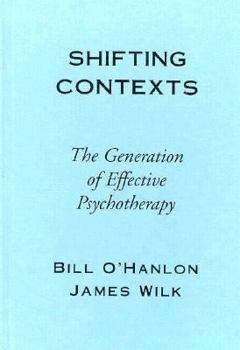Shifting Contexts: The Generation of Effective Psychotherapy
Select Format
Select Condition 
Book Overview
Bill O'Hanlon, MS, LMFT, has authored or co-authored 30+ books, the latest being Becoming a Published Therapist (W.W. Norton, 2012) This description may be from another edition of this product.
Format:Hardcover
Language:English
ISBN:0898626773
ISBN13:9780898626773
Release Date:September 1987
Publisher:Guilford Publications
Length:289 Pages
Weight:0.96 lbs.
Dimensions:1.1" x 6.3" x 9.2"
Customer Reviews
3 ratings
making psychotherapy more effective
Published by Thriftbooks.com User , 18 years ago
SHIFTING CONTEXTS is about making psychotherapy more effective. Focusing exclusively on obtaining effective therapeutic results, the authors assert that all clinicians, regardless of orientation, should spend less time analyzing the reasons behind human behaviorand concentrate instead on efficiently promoting change. Having noted commonalities in cases that were resolved in the first and only session, O'Hanlon and Wilk set out to see if "one-session psychotherapy" could be made a more regular event in therapeutic practice. The result of their investigations is an approach whose focus is not that therapy should necessarily be completed in one to three sessions, but rather that sessions should be made as effective as possible. Exposing the underlying structure beneath the various schools of psychotherapy to find the common foundations, the authors present a generic model of problem-solving consultation that will enhance the efficacy of any clinician's practice. The approach that they have developed, "clinical epistemology," frees therapist and client alike from self-imposed limitations by identifying and undermining their presuppositions. Central to the approach is the careful sifting of facts and the notion that the presenting problem in therapy is not "given" but is mutually constructed by therapist and client. The authors provide an explicit set of rules for establishing the conditions for workable psychotherapy, negotiating a solvable problem and successfully guiding the client to take effective action. Often, negotiation of the presenting complaint shifts the client's and therapist's presuppositions, and the problem simply dissolves. Where the process of negotiating the presenting complaint proves insufficient in itself to bring about the desired therapeutic results, a powerful approach to change is offered that involves intervening in patterns and transforming contexts through minimal, often unobtrusive, interventions. Also, as the authors point out, clinical epistemology can provide therapists with a means of self-supervision that will help them get unstuck in seemingly intractable cases. Recognizing the client as an equal participant in the therapeutic process, the approach respects the ability of clients to utilize their own resources to solve their own problems and to see their way clear to taking whatever action needs to be taken. General considerations about details of the psychotherapeutic session are also explored, including the importance of using ordinary language in therapeutic sessions, the prejudices and assumptions that language can reveal, and the significance of the therapist's manner and style. Because the authors emphasize practice over theory, SHIFTING CONTEXTS will be a particularly useful book to all clinicians, providing them with concrete tools and methods that will enhance their effectiveness as therapists.
The Best!
Published by Thriftbooks.com User , 19 years ago
I bought this book new in 1987. It's the best! Why? For the simple reason that it cuts right through the crap with regards to what psychotherapy is all about. And getting people to examine their beliefs and the basis for their beliefs is what psychotherapy is all about. Clinical epistemology! Here's an example of how it works: In 1987 or so, after I read the book, I interviewed a very schizophrenic person who provided me with a 30 minute, non-stop deluge of word-salad. It made no sense at all. When it was done I said to my client...'sum everything up for me in one sentence.' The client then said "I'm pissed!" This book will save you tons of time and pointless analysis.
For therapists who want to think about what it is they do.
Published by Thriftbooks.com User , 26 years ago
For anyone who has an interest in clinical epistomology, i.e., how we know what we know about therapy, this is, quite simply, one of the best books I've ever read about the "doing" of psychotherapy. It is one of those books that I look at over and over for the challenges to traditional approaches that I find it provides. Although some might find it dense, the material is facinating for those with a desire to delve more deeply into the workings of the process of psychotherapy.At this date, almost anyone involved in the field of therapy has heard about, or attended workshops in the area solution-oriented or possibility therapy; this book provides some of the underpinnings for what may be the most exciting developments in psychotherapy since Freud first led a patient to the couch!This book encouraged me to ask questions about the work I do as a therapist, the beliefs we hold about therapy and where those beliefs come from, and how we know that what we do works. All in all, a very satisfying and thought-provoking read






